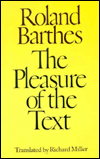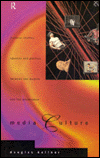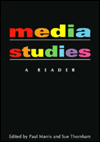Media Theory and Criticism
1 Media Criticism
Image over Substance: An Example of Postmodern Politics: Max Horkheimer and Theodor Adorno, commenting on Hitler’s propagandistic use of the radio, note “the gigantic fact that the speech that penetrates everywhere replaces its content,”1 a formula that has been taken one step further by television: On TV, the image dominates, overpowering not only the fact of speech but also its content. Read more …
overpowering not only the fact of speech but also its content. Read more …
Why Can’t We Stop Watching TV? Roland Barthes, writing in The Pleasure of the Text, has an explanation for a befuddling recurrence: Why so many people, including myself, watch so much bad TV even when we know it is awful. Barthes’s answer: pleasure. He elaborates thus: Read more …
Decoding Web Sites that Function as Propaganda Machines: Since both text and graphics and the interaction between the two are used as modes of rhetoric in the context of multimedia, classical rhetoric provides a good basis for a defensive analytical system that allows users to deconstruct websites with poisonous messages. Read more …
How the Erosion of Newspaper Journalism Is Putting Democracy At Risk
 Principles of Media Criticism: Media criticism is in an undeveloped state, today, largely because the mainstream media allows virtually no open discussion of the subject. Some criticism does get to the public, of course, but most of it is corrupted by the same forces that have turned the rest of the media into a source of manipulation. (By Ken Sanes, ) Read more …
Principles of Media Criticism: Media criticism is in an undeveloped state, today, largely because the mainstream media allows virtually no open discussion of the subject. Some criticism does get to the public, of course, but most of it is corrupted by the same forces that have turned the rest of the media into a source of manipulation. (By Ken Sanes, ) Read more …
Book Review of Read All About It: The Corporate Takeover of America’s Newspapers:  Read All About It: The Corporate Takeover of America’s Newspapers is an institutional acknowledgement of what many wary readers have known for years: Corporate control is ruining our daily newspapers. Read more …
Read All About It: The Corporate Takeover of America’s Newspapers is an institutional acknowledgement of what many wary readers have known for years: Corporate control is ruining our daily newspapers. Read more …
2 Media Theory
Foucault: A Lover’s Discourse about Madness and the Media: Roland Barthes, writing in the early 1970s, begins The Pleasure of the Text with these words:  Read more …
Read more …
An Analysis of Kellner’s Theory of Media Culture:  In an era when the media have grown to be one of the most dominant forms of culture in North American – so dominant, in fact, that the they can now be seen as the pinnacle of commercial culture – an explanatory theory of the media becomes paramount. Yet considering the intimate relationship between culture and media and that, for many, the media have become their culture, a theory that views the media outside the context of culture will be afflicted with myopia. Thus, for completeness, a theory of the media requires a firm connection to culture in its every step. Douglas Kellner, in his book Media Culture: Cultural Studies, Identity and Politics Between the Modern and the Postmodern, sets out to make these connections. Read more …
In an era when the media have grown to be one of the most dominant forms of culture in North American – so dominant, in fact, that the they can now be seen as the pinnacle of commercial culture – an explanatory theory of the media becomes paramount. Yet considering the intimate relationship between culture and media and that, for many, the media have become their culture, a theory that views the media outside the context of culture will be afflicted with myopia. Thus, for completeness, a theory of the media requires a firm connection to culture in its every step. Douglas Kellner, in his book Media Culture: Cultural Studies, Identity and Politics Between the Modern and the Postmodern, sets out to make these connections. Read more …
Why Can’t We Stop Watching TV? Roland Barthes, writing in The Pleasure of the Text, has an explanation for a befuddling recurrence: Why so many people, including myself, watch so much bad TV even when we know it is awful. Barthes’s answer: pleasure. He elaborates thus: Read more …
Saussure’s Sign: The sign, the signifier, and the signified are concepts of the school of thought known as structuralism, founded by Ferdinand de Saussure, a Swiss linguist, during lectures he gave between 1907 and 1911 at the University of Geneva. His views revolutionized the study of language and inaugurated modern linguistics. The theory also profoundly influenced other disciplines, especially anthropology, sociology, and literary criticism. The central tenet of structuralism is that the phenomena of human life, whether language or media, are not intelligible except through their network of relationships, making the sign and the system (or structure) in which the sign is embedded primary concepts. As such, a sign – for instance, a word – gets its meaning only in relation to or in contrast with other signs in a system of signs. Read more …
Ferdinand de Saussure, a Swiss linguist, during lectures he gave between 1907 and 1911 at the University of Geneva. His views revolutionized the study of language and inaugurated modern linguistics. The theory also profoundly influenced other disciplines, especially anthropology, sociology, and literary criticism. The central tenet of structuralism is that the phenomena of human life, whether language or media, are not intelligible except through their network of relationships, making the sign and the system (or structure) in which the sign is embedded primary concepts. As such, a sign – for instance, a word – gets its meaning only in relation to or in contrast with other signs in a system of signs. Read more …
Using French Social Thought for Media Criticism With a focus on Althusser, Barthes, and Foucault, this essay broadly delineates the theoretical approaches of the three schools in explaining the role of the mass media in society. As I proceed, I enumerate several strengths and weaknesses of each theory and make some comparisons among them. Read more …
3 Media Culture
Why Can’t We Stop Watching TV? Roland Barthes, writing in The Pleasure of the Text, has an explanation for a befuddling recurrence: Why so many people, including myself, watch so much bad TV even when we know it is awful. Barthes’s answer: pleasure. He elaborates thus: Read more …
Live Show: The Connotations of Visual Signs:  “The level of connotation of the visual sign, of its contextual reference and positioning in different discursive fields of meaning and association, is the point where already coded signs intersect with the deep semantic codes of a culture and take on additional, more active ideological dimensions,” Stuart Hall writes in his essay “Encoding/decoding.”1 I almost know what he means. Read more …
“The level of connotation of the visual sign, of its contextual reference and positioning in different discursive fields of meaning and association, is the point where already coded signs intersect with the deep semantic codes of a culture and take on additional, more active ideological dimensions,” Stuart Hall writes in his essay “Encoding/decoding.”1 I almost know what he means. Read more …
4 Newspapering
Relation Between Civic Society and Newspapers in the Writings of Alexis de Tocqueville and Robert Putnam: The purpose of this essay is to demonstrate how Robert Putnam’s findings in Making Democracy Work and in a later study he published on civic participation in the United States, “The Strange Disappearance of Civic America,” support Tocqueville’s views. This will be accomplished in two steps. The first will examine whether the specific views of Tocqueville regarding associations and newspapers and the relations between them are borne out in Putnam’s findings. The second step will examine how Putnam’s findings support Tocqueville’s central hypothesis: That equality is the fundamental condition in a democracy from which others are derived. A final section of the essay will specify several normative implications that may be drawn from Putnam’s findings, especially those outlined in “The Strange Disappearance of Civic America.” Read more …
The Future of American Newspapers: A Forecast Written in 1991
Motivations for News Language Style: Audience Perception or Cultural Orientation
The Mythological Language Of American Newspapers
5 Film
Masculine Identity in the Service Class: An Analysis of Fight Club:  This film will be more enjoyable for those who see it first and then read this analysis because, like The Sixth Sense or The Crying Game, Fight Club has a secret, which this discussion will reveal. Read more …
This film will be more enjoyable for those who see it first and then read this analysis because, like The Sixth Sense or The Crying Game, Fight Club has a secret, which this discussion will reveal. Read more …
The Truman Show: Media as Metaphor
Chroma-Cinema: The Use of Color in Color and Black-and-White Films
Until the End Of the World: Fin de Siècle Fears in History and Popular Culture